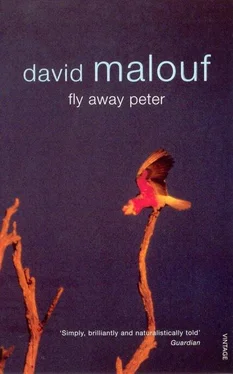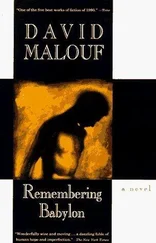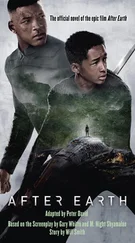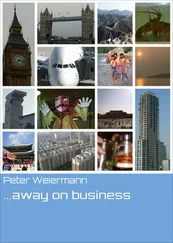There were so many worlds. They were all continuous with one another and went on simultaneously: that man’s world, intent on his ancient business with the hoe; his own world, committed to bringing these men up to a battle; their worlds, each one, about which he could only guess.
They were resting now, given over as deeply and as quickly as possible to sleep. In three more minutes they would be lumbering out to take their places on the road. By morning —.
A few miles away, behind concrete emplacements, the machine guns were already set up waiting. The deadly sewing-machines were stitching their shrouds.
He was profoundly weary of all this. Once or twice during his years at Cambridge he had spent a hunting weekend at Gem Oliver’s place in Shropshire. They had sat in bunkers in the woods while beaters drove the small game towards them, and fired and fired, watching the creatures spring up and turn somersaults in the air or roll away twitching. It was like that out here. The men, scarcely believing they could be walking upright at last, and in daylight, in a place where they had always gone on their bellies by night, would move in ragged lines towards the guns, and in a flickered chattering dream, as the bullets whipped the air all about them or following their own trajectory, passed magically through, would, after seconds some, and minutes others, go down in waves under the whistling blades and lie randomly about, as they did now in the relative quiet of the grass.
Ashley blew his whistle. Slowly, as in a dream, the men rose and stumbled into the road.
He was surprised as always, as they came to attention, to find that they harboured within them, these peaceable farmers, cattlemen, clerks, plumbers, pastry-cooks, ice-men, shop-assistants, and those who had never done more than hang about billiard parlours or carry tips to race-courses, or sport flash clothes in city pushes, the soldier — hard, reliable, efficient — they could so smartly become. The transformation was remarkable.
It wasn’t simply the uniform, though that was the mark of it; or the creation through drilling of a general man from whom all private and personal qualities had been removed. The civilian in these men survived. You saw it in the way a man wore his hat, or in the bit of cloth he chose — an old shirt-tail or singlet, a roll of flannel, a sock — to protect the bolt of his rifle. You heard it in the individual tilt of his voice through even the most conventional order or response. It was the guarantee that they would, one day, cease to be soldiers and go back to being school-teachers, mechanics, factory-hands, race-course touts.
It had happened to him as well. He had quite unexpectedly discovered in himself, lurking there under the floral waistcoat and his grandfather’s watch-chain, the lineaments of an officer. He was calm, he kept his head; he kept an eye out for his men; they trusted him. He was also extraordinarily lucky, and being lucky had seen many men over these months, whose luck wasn’t as good as his own, go down. This new lot — who started out now as he gave the signal and the line began to move — they too would go down. They were ‘troops’ who were about to be ‘thrown in’, ‘men’ in some general’s larger plan, ‘re-enforcements’, and would soon be ‘casualties’. They were also Spud, Snow, Skeeter, Blue, Tommo. Even he had a nickname. It had emerged to surprise him with its correspondence to something deep within that he hadn’t known was there till some wit, endowed with native cheek and a rare folk wisdom, had offered it to him as a gift. He was grateful. It was like a new identity. The war had remade him as it had remade these others. Not forever, but in a way he would never entirely outgrow.
Ashley, whose mind was of the generalizing sort, had seen quite clearly from the beginning that what was in process here was the emergence of a new set of conditions. Nothing after this would ever be the same. War was being developed as a branch of industry. Later, what had been learned on the battlefield would travel back, and industry from now on, maybe all life, would be organised like war. The coming battle would not be the end, even if it was decisive; it was another stage in the process.
It seemed more important than ever now to hang on to the names, the nicknames, including his own, and if his luck held, to go back. And having learned at last what the terms were — and in expiation of the blood that was on his hands — to resist.
JIM LEANED, HALF-SITTING, half-lying, against the wall of the ditch, glad to feel the earth against his cheek, and also his shoulder, as he waited rifle in hand for the whistle that would take them in.
They had come up in the dark following a white tape, and stakes, also white, that had been driven into the ground but washed out overnight by a storm. After weeks of hot dusty weather the rains had come and the earth was sodden and astream. Just an hour ago there had been a bombardment. So many men were killed in the rear line that the companies being held there had been brought up with the rest, and they were all packed now into the same narrow space, a terrible press of men, stunned, anxious, elated, solemnly waiting.
Jim looked down the line of men who half-stood, half-sprawled against the opposite wall. It was like seeing his own group repeated in a glass, or like looking at the wall itself, since the men, their uniforms all caked in mud, seemed little more in the dim light than another wall built up out of faces with deep ruts in them and rocklike, stubbled jaws, skin greasily shining where it was drawn over the skullbones, knuckles grained with dirt, coarse-grained necks above collars grimed at the edge, the cloth of the uniforms also coarse, and like the faces all of one colour, the earth-colour that allows a man to disappear un-noticed into the landscape, or to pass through, hunched shoulders, flexed knee and elbow, into a wall.
But the wall was in motion, even in its stillness. The bodies were not all here. His own wasn’t. Some of them were in the past and in another country; others might already have leapt the next few minutes into the future, and were out in the firestorm, or had got beyond even that to some calm green day on the other side of it. Those who were stolidly here in the present had gone deep inside themselves and were coming to terms with the blood as it rolled round and round from skull to foot, still miraculously flowing in its old course; or with that coldness in the pit of the stomach that no rum could touch; or that shrinking in the groin as belts were tightened, that withdrawal of their own most private parts, that said: No further, the line ends here. They were communing with themselves in words out of old nursery prayers, naming the names of those they had been instructed to pray for, the loved-ones; they were coaxing themselves, cheering themselves up, using always their own names, but as they had heard it when they were so young that it still seemed new and un-repeatable; holding at bay on their breath that other form of words, the anti-breath of a backward-spelled charm, the no-name of extinction, that if allowed to take real shape there might make its way deep into the muscles or find a lurking place in the darkest cells. No, I am not going to die.
One fellow, with calm grey eyes and a thin mouth, was smoking. Pale clouds drifted before him, greyer than his face, and his eyes were like flints in a wall. He cupped his hand and drew again on the cloud-machine. Another long drift, smoky-grey. And behind it the hand that was square and solid earth.
I am getting too far ahead , Jim thought. That is for later. I should get back to where I am.
None of this came to him as so many words. He perceived it or it unfolded in him. What he saw in clear fact was a line of children, sleepily and soberly intent, who waited with their knees drawn up for a journey to resume after a minor halt. He thought that because the place where they were waiting had been a station on the line from Menin to Ypres. Children might once have waited here on slow trips to the city. He closed his eyes and could have slept.
Читать дальше












